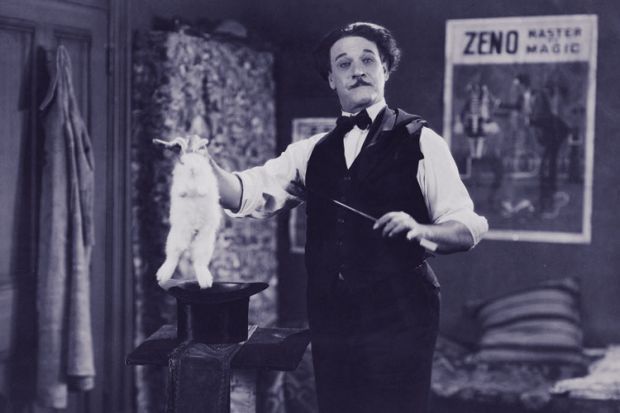How much are the dark arts of Machiavellian manipulation applied in the running of a university?
Quite a lot, argues a study that has revealed some of the unseen political manoeuvres, tricks and tactics used by management to push through controversial and unpopular policies at UK universities.
But the spinning, schmoozing and other types of “under-stage” activities that go on outside the meetings where decisions are made officially should not always be viewed as underhand or malign, according to the new Leadership Foundation for Higher Education report.
In fact, the use of such tactics is often both necessary and desirable if those in leadership positions are to build consensuses and effect institutional change, says the report, In the Wings and Backstage: Exploring the Micropolitics of Leadership in Higher Education.
“Command and control is a very weak force in universities – academics are a stroppy lot and don’t like being ordered around,” said its author Jacky Lumby, professor of education at the University of Southampton.
To lead a large cohort of headstrong staff requires more than just the “technical skills” of applying the numerous rules and regulations, Professor Lumby added.
“If you want to get anything done at a university, you need to use a more subtle set of skills.”
Her judgment is supported by many of the 14 higher education leaders, including vice-chancellors and pro vice-chancellors, interviewed by Professor Lumby for the study.
“There is a group of vice-chancellors who are extremely engaged in what you might call the ‘under-stage’ activity,” confided one university leader quoted in the report.
Another interviewee called this politicking the “lifeblood of all universities”, while another branded it a “fact of organisational life”.
“If you want to operate in a university, you have to learn to operate through influence,” observed one vice-chancellor.
“If you have to exercise power in its naked form, you’re perhaps doing something not quite right,” according to another interviewee.
One registrar suggested that “it isn’t enough to simply exert influence down the line management chain, one needs to be able to influence across and upwards as well.”
Even those at the very top of an organisation still paid attention to politicking, with one describing efforts to build a “legitimacy base” for forthcoming institutional changes.
One key area where “micropolitics” are crucial is meetings – or more precisely, the games played before departmental or senior management meetings.
“We are so short of time that it isn’t always practical to present people with an idea, have rational discussions and eventually come to a decision on an issue,” said Professor Lumby, who added that her interviewees viewed this open-ended decision-making process as time-consuming and ineffective.
“In an ideal world, leaders will speak to everyone and get their view, but this is not generally the case,” she said.
“They would instead do something more informally outside the meeting, such as having conversations in the corridor or over a cup of coffee.”
More idealistic junior academics are often unwilling to throw themselves into this sort of game-playing, but they need to be aware that it is happening to avoid ending up on the wrong end of it, Professor Lumby said.
“We tend to be taught a textbook ‘heroic’ model of leadership where everyone is transparent and collegial,” she said.
“We do not get the part about what it is really like to be a leader – micropolitics is a fundamental and universal part of leadership practice.”
Nine political tricks used in higher education management
Some of the sector’s more common tactics, as revealed by managers interviewed for the Leadership Foundation report
- Using quick-fire questions, selective information and insistence on immediate decisions at meetings so a chair can “railroad” people into their way of thinking
- “Corridor conversations” to build a pre-meeting consensus, thereby avoiding “mass counterproductive confrontation”
- Controversial items being placed further down a meeting agenda and minutes being prepared in a way that obscures opposition to a forthcoming change
- Meetings being swamped by large numbers of incomprehensible papers
- Stage-managed information roadshows being used to ensure that presentations and questions are carefully controlled
- Vice-chancellors or pro vice-chancellors being invited for a cup of coffee in a public place to talk over an issue so others see that a manager has the ear of influential figures
- Relationships with national figures being cultivated to build a manager’s status within an institution
- Vice-chancellors avoiding speaking first on tricky issues, thereby inhibiting debate or projecting a sense that a decision has already been made
- Having a more secure grasp of details than opponents.
POSTSCRIPT:
Print headline: Backstage with Machiavelli and the vice-chancellor
Register to continue
Why register?
- Registration is free and only takes a moment
- Once registered, you can read 3 articles a month
- Sign up for our newsletter
Subscribe
Or subscribe for unlimited access to:
- Unlimited access to news, views, insights & reviews
- Digital editions
- Digital access to THE’s university and college rankings analysis
Already registered or a current subscriber?





